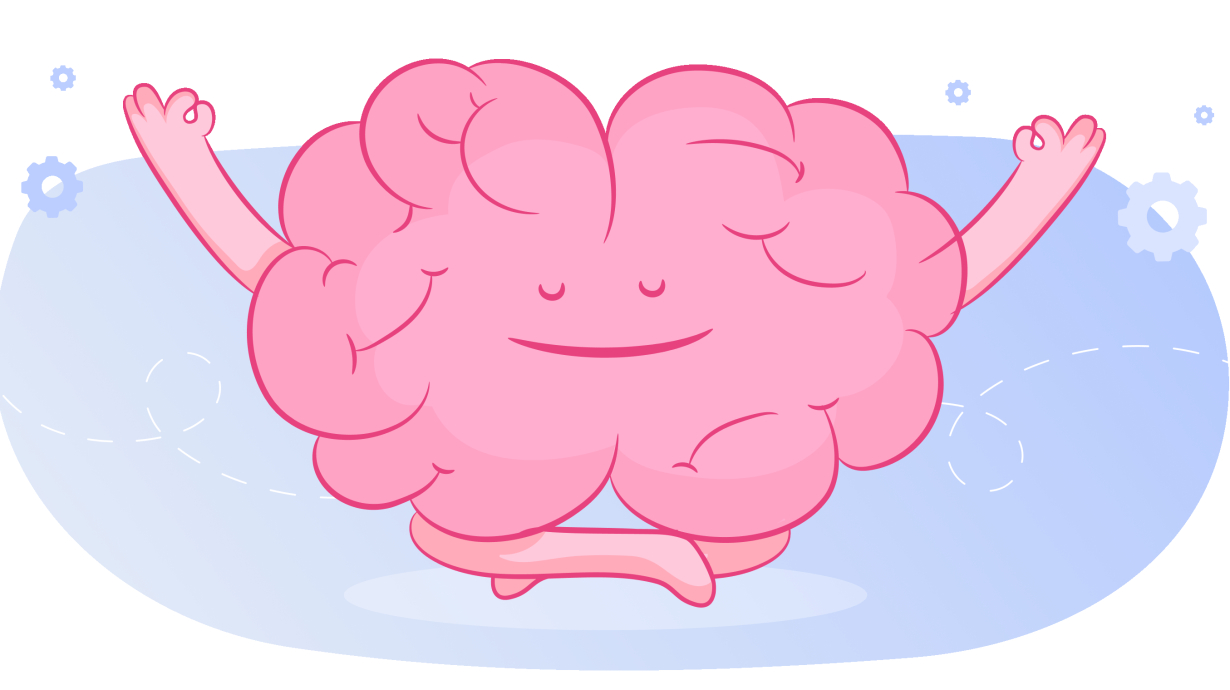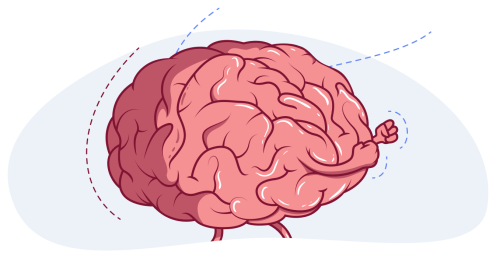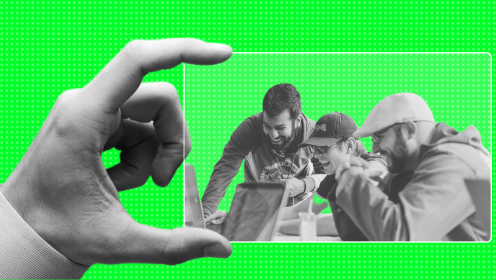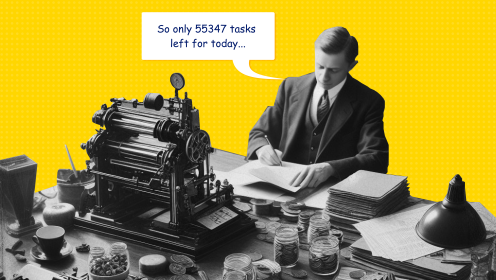You are zoned out and out of ideas. It’s difficult to concentrate on anything, and yet you still feel like your brain will explode with information any moment now. Sounds familiar? That is how the brain signals mental overload. Here are some tips on how to relax the mind, go default mode and reactivate your creativity.
What is brain hygiene
Hundreds of notifications, dozens of work chats, funny cat videos, push-ups and ads — all this stuff accumulates in our heads and eventually feels like a heavy burden. When the brain is polluted with information, it’s called mental overload — and brain hygiene is here to help. So let’s discuss why it’s so necessary and how to relax your mind.
It is clear for everyone why it’s critical to maintain body hygiene, but brain (or mental) hygiene remains more of a mystery. The brain needs to be clean and clear too — free of all unnecessary information and decisions made throughout the day.
The brain hygiene is a controlled process of slowing down the mental chat and limiting the information noise. It gives the brain a much-needed time to process the experiences and events of the day.
Why is it important to reload the mind
Based on the 2020 research, the total amount of data on the Internet reached 59 zettabytes. For comparison, it’s around 690 trillion 'Never Gonna Give You Up’ music videos. By 2025 it is expected to reach 175 zettabytes — which means it will become even more difficult to hide from the information.
Mental overload is a major problem in the civilized world. Our brains tire constantly from nonstop information consumption. Ignoring this state can lead to chronic fatigue syndrome or mental illnesses, such as anxiety or depression.
There are many possible signs of mental overload. You might miss your bus stop or throw a spoon in the trash instead of the yogurt jar. It becomes harder to come up with new ideas, and that makes you even more angry and sloppy. At the end of the day you feel tired and empty.
If that’s the case, you definitely need to unload your mind. The brain desperately needs to unplug from the outside world, unfocus, and take time to process and reload.
Without reloading your mental system will quickly burn out. That weakens memory and concentration abilities, increasing irritability. There will be no place left in the mind for growth and creativity — you’ll eventually stop seeing the bigger picture.
How to relax the brain — 4 ways to clear the mind
Control the information channels
- Limit screen time. Set time limits for different apps or overall device usage. Scheduled night mode also helps.
- Unsubscribe from useless channels and block ads. Don't hesitate to leave the chats you no longer need and disable notifications. It is also better to have 1 or 2 trusted news channels. Install the AdBlock browser extension to avoid most ads. And unsubscribe from the pile of mailing lists — the button is usually small and gray.
- Leave your mobile phone alone for the night. Excluding blue screen light for one hour before bed enhances sleep quality. Moreover, you'll be less likely to succumb to the temptation of ‘just five minutes more’.
Train & keep proper posture
- Try walking and training regularly. Even 20 minutes a day will make a difference. Physical activity quickens your pulse, makes oxygen reach the brain faster and creates new cells. These cells will form new neural connections that improve thinking. Stuck on a difficult task? Make time for a walk — your brain will reactivate and come up with a solution.
- Keep a good posture. Might sound unobvious — but it’s surprisingly effective. In 2013 professors from Harvard and Columbia University conducted an experiment and established that a bent body position slows down the thinking process and even provokes depression.
Organize your routine
- Structure plans and ideas. Now that’s a job for WEEEK. You can organize daily tasks in the task manager and keep ideas, school notes and any kind of lists in the knowledge base. Unload the mind from tasks and plans.
- Write down notes (yes, pen on paper). It might feel limiting to use a digital assistant for everything, so we still recommend returning to paper sometimes. Write down thoughts, sketch ideas for projects, or even list to-dos. I mean, how satisfying does it feel to cross off completed tasks?
- Keep a diary. Handwritten or digital — whichever you prefer. Reflect on life events, live through feelings and document them on paper or computer. You can keep a diary in a private project in the knowledge base, accessible only to you.
Go to default mode
Finally, the most significant point. What's the default brain mode, and how does it help stay on top of things?
Default mode is a young cognitive science term. It is a state of the brain when it’s not engaged in anything — no tasks, no focus. Only dreams and stress-free (!) reflections on the past and the future.
The research on default mode provides many insights into the human brain activity.
🧠 During rest time, when a person is doing nothing and tries not to think, it stimulates the frontal lobe of the brain. The one is responsible for strategy, planning, rational thinking, and decision-making. Tomography shows how the brain clears itself out — literally.
It is paradoxical, but while a person rests, the brain works and clears out headspace. As a result, the person is both rested and organized.
Resting provides resources for creative thinking and strategy planning. After enough rest your brain can come up with a creative idea or an unexpected solution!
To switch to default mode, simply lie down or sit, close your eyes and do nothing at all — no housework, walking or listening to podcasts. You need to stop all irritation channels and stay in this state for five minutes. Whenever thoughts come into your head, try to let them go, don't hold onto them. After some training, you can increase the time to 7, 10 or even 20 minutes.
You can set a timer for default mode in WEEEK — click the lotus icon in the top panel of your workspace.
Sounds like meditation? Kind of, but you don’t have to concentrate on the breath and strike a specific pose. Reverting to default mode is more of a philosophical reflection that can lead to your personal «Eureka!» .
***
Now that you’re aware of mental overload and possible solutions, we hope you’ll apply these techniques to your daily life. Remember that quality rest time and in-time brain hygiene can enhance your productivity and unlock creative skills.
















